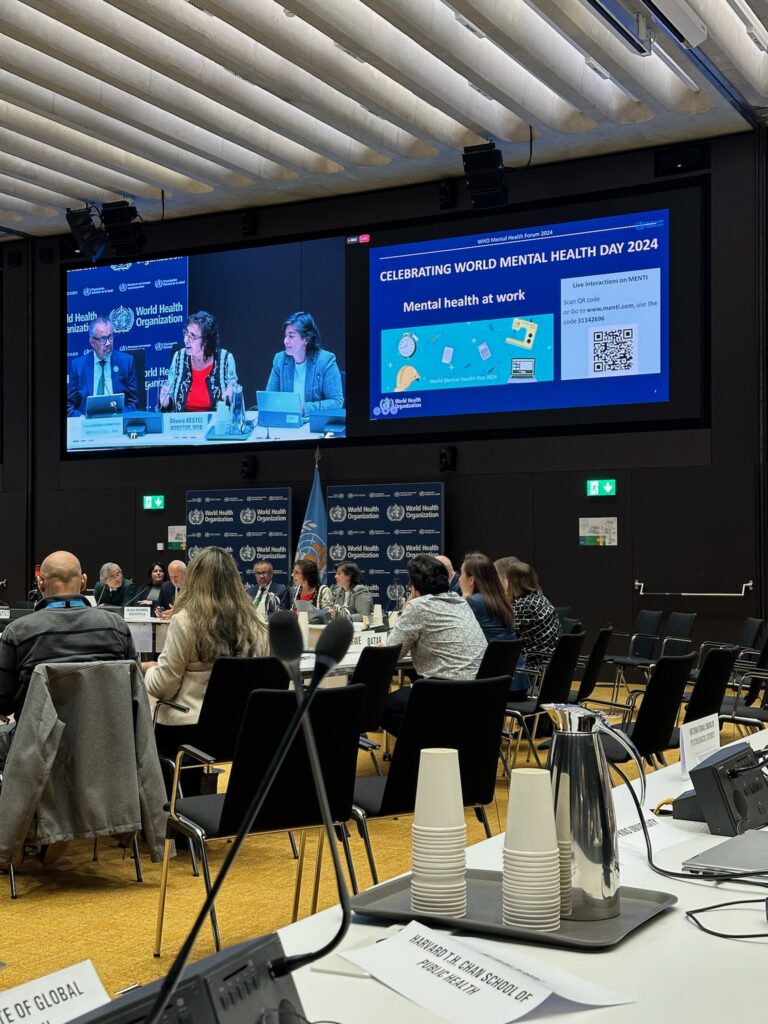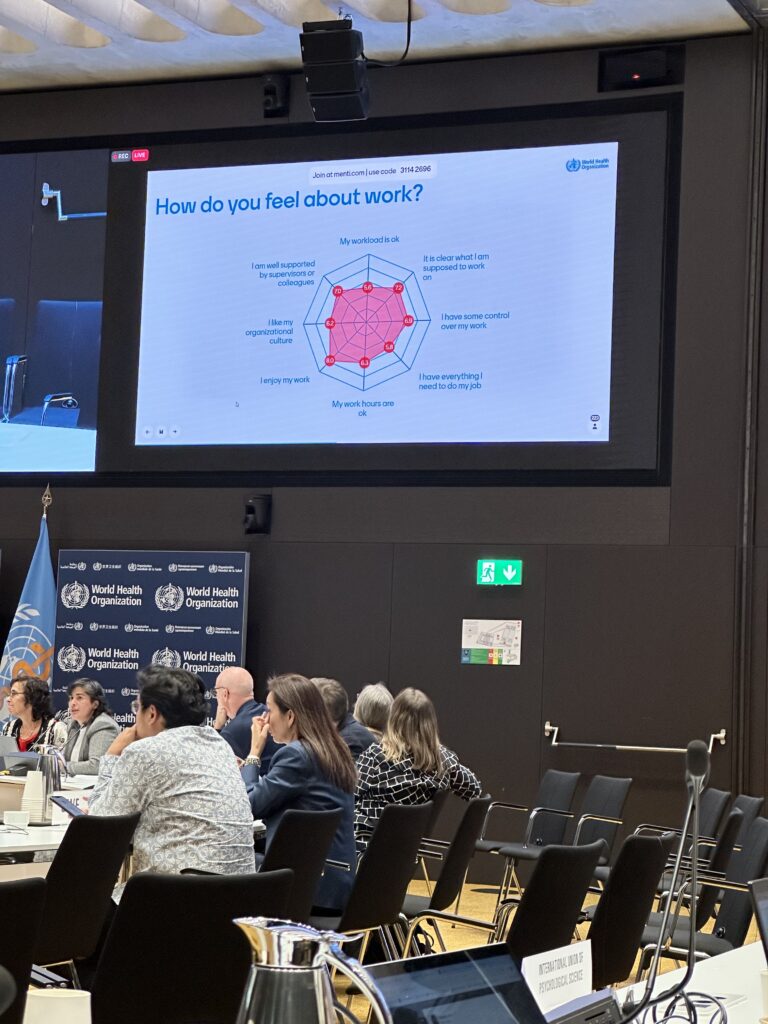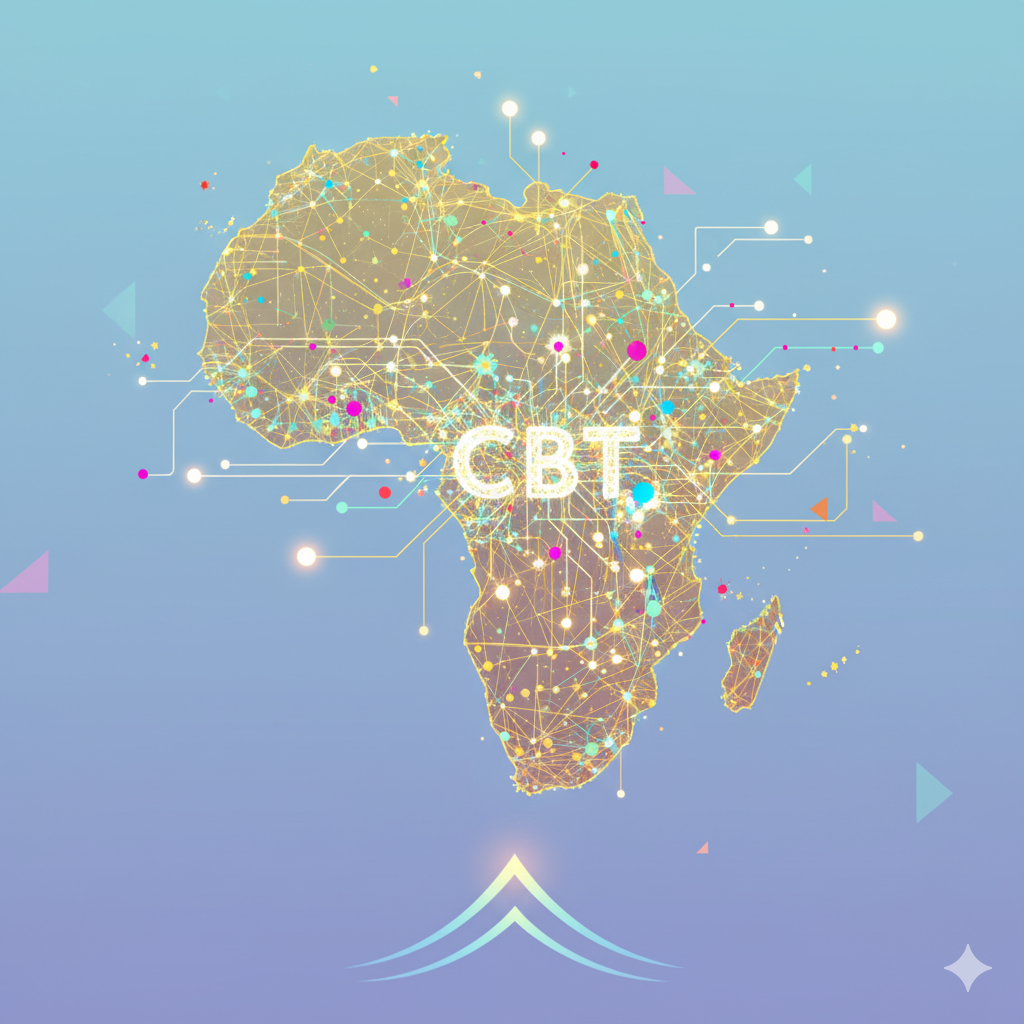
WCCBT × WHO: Collaboration to Expand Global Access to Evidence-Based Psychological Interventions
The WCCBT works with compatible global organizations such as the World Health Organizations on shared goals and objectives to expand access to evidence-based psychological interventions. The WCCBT is also keen to work with other global organizations with a shared mission such as UNESCO and UNICEF, and other established global groups and associations.
Our Partnership
The World Confederation of Cognitive and Behavioural Therapies (WCCBT) and the World Health Organization (WHO) have a shared commitment to integrity, science and excellence in health, and a shared mission to improve global mental health by expanding access to effective, evidence-based psychological interventions across the globe.
In September 2023, WCCBT initiated a memorandum of understanding with the WHO with the shared goal of increasing global access to competently delivered evidence-based psychological care across the world. Since then, the WCCBT and WHO Mental Health Unit have worked together through educational events, shared initiatives, expert inputs, and joint dissemination efforts across the globe.
WHO Status: WCCBT is a non-state actor currently engaged with the WHO in a vendor status with the WHO, which enables the WCCBT to collaborate with the WHO-Mental Health Unit, disseminate their psychological tools, initiatives and resources globally, engage in joint initiatives, and review and provide feedback on WHO psychological intervention, implementation, and competency materials.
This partnership represents an important step toward WCCBT’s goal of developing formal relations as a non-state actor with the WHO to further advance common priorities in evidence-based mental health care, training, implementation, competency and access to care worldwide.
WCCBT Collaboration with WHO: Working Together Toward Shared Goals
WCCBT and WHO collaborate to strengthen the global delivery of evidence-based psychological interventions through:
- Global advocacy for scalable, culturally adaptable, and accessible evidence-base interventions.
- Joint educational webinars and dissemination initiatives.
- Review and feedback on WHO’s intervention manuals and implementation materials.
- Vendor partnership supporting and promoting WHO initiatives and products on training and competency frameworks.

History of WCCBT-WHO Collaboration: 2023–2025
2023
WCCBT-WHO collaboration
At the WCCBT Congress in Seoul, S. Korea, Past-President Dr. Keith Dobson (2020-2023), President Dr. Lata McGinn (2023-2026), and Board of Directors Dr. Mehmet Sungur (2023-2026) and Dr. Luis Flores (2023-2026) held a meeting with Dr. Mark Van Ommeren, head of the Mental Health Unit of the World Health Organization (WHO) to initiate a collaboration between the WCCBT and the WHO.
Dr. Mark Van Ommeren, head of the W.H.O Mental Health Unit gave a keynote the WCCBT World Congress in Seoul, S. Korea in June, 2024 on W.H.O’s work to scale psychological interventions and measure competency.
On behalf of the WCCBT, President Dr. Lata McGinn signed a memorandum of understanding between WCCBT and WHO in September 2023 to initiate the formal collaboration on shared mission, goals, and objectives.
WCCBT-WHO Taskforce (Dr. Lata McGinn and Dr. Keith Dobson and) began regular meetings with the WHO mental health team, WHO Department of Mental Health, Brain Health and Substance Use, (Dr. Mark Van Ommeren, Head of the WHO Mental Health Unit, Dr Ken Carswell, a WHO mental health specialist with focal point for innovation, digital mental health and scalable psychological interventions, and Dr James Underhill as the Coordinator for the Ensuring Quality in Psychological Support (EQUIP) Project for the WHO Department of Mental Health and Substance Use) to discuss how the two organizations might be able to support their compatible goals and to develop shared goals and initiatives. For example, early discussions included dissemination of WHO’s Equip program to WCCBT members and beyond, and the possibility of experts in training and evaluation from the WCCBT evaluate aspects of EQUIP, perhaps even adding to the competencies that are included there.
- WCCBT celebrated WHO’s World Mental Health Day 2023 theme “Mental health is a universal human right” to increase awareness and mobilize action to protect everyone’s mental health.
- WCBB disseminated the key initiatives continued from the Comprehensive Mental Health Action Plan 2013–2030, implement by member to strengthen leadership, improving community-based care, and implement promotion and prevention strategies
- WCCBT hosted the first WHO–WCCBT webinar featuring Dr. James Underhill, WHO’s EQUIP Project Coordinator, titled “An Introduction to the WHO–UNICEF EQUIP Initiative.” The webinar introduced WHO’s Ensuring Quality in Psychological Support (EQUIP) digital tools for assessing and strengthening provider competence and showcased WHO–UNICEF’s global initiative to improve the quality of mental health support delivered by non-specialists (Source: WCCBT W.H.O Webinar by Dr. James Underhill, December 20, https://youtu.be/l0xBI0S9Fug?si=IC_i9Qwvnp32Kkgl).
- WCCBT disseminated the following WHO initiatives, guidelines and manuals published in 2023 across all public platforms and its regional members in Asia, Australasia, Canada, Europe, North America, South and Central America, and the Caribbean:
WHO Guidelines
- Mental Health Gap Action Programme (mhGAP) guideline, version 3.0: This major update released by the W.H.O in November 2023 helps non-specialist health workers in low- and middle-income countries treat mental, neurological, and substance use conditions. It incorporates the latest evidence, adding 18 new recommendations and updating 30 others to strengthen mental health care. For example, this edition contains new recommendations on treating anxiety disorders
- Preventing suicide: a resource for media professionals, update 2023: Released in September 2023, this update provides guidelines for media professionals on how to report on suicide responsibly. It focuses on presenting stories of hope and recovery while avoiding reporting that can lead to imitative behavior.
- Report of a virtual roundtable meeting on online mental health content for young people: This report, published in October 2023, summarizes expert discussions and outlines ten guiding principles for creating effective and safe online mental health content for young people.
WHO Manuals
- Early Adolescent Skills for Emotions (EASE): Launched by the W.H.O in December 2023 in partnership with UNICEF, EASE is an evidence-based group psychological intervention for adolescents aged 10–15 years who are experiencing distress. It is delivered by trained non-specialist helpers and focuses on skills adapted from cognitive-behavioral therapy.
- Study on low-intensity psychosocial interventions: A systematic review and meta-analysis published by the W.H.O in World Psychiatry in September 2023 summarized the favorable effects of WHO’s low-intensity psychosocial interventions, including Problem Management Plus (PM+) and its digital adaptation, Step-by-Step (SbS).
WHO Competency and training materials
- Self-care competency framework (Volumes 1 & 3): These materials, published by the W.H.O in July 2023, are part of a larger framework designed to equip health and care workers with the competencies needed to support people’s self-care practices. Volume 1 defines the competencies, while Volume 3 serves as a curriculum guide.
- Ensuring Quality in Psychosocial and Mental Health Care (EQUIP): While launched earlier by the W.H.O, the development process for this competency assessment platform concluded in 2023, and global training courses on its use were held throughout the year. This W.H.O platform is designed to ensure that psychological support delivered by non-specialists is safe and effective.
2024
WCCBT-WHO Collaboration
- WCCBT and WHO signed a vendor agreement, marking a formal mechanism for collaboration.
- Meetings between the WCCBT Taskforce and WHO mental health team were held throughout the year to plan and enact 2024 activities.
- WCCBT hosted a second WHO–WCCBT webinar featuring Dr. Ken Carswell, WHO Mental Health Specialist, titled “Supporting Communities Affected by Adversity: An Introduction to WHO’s Work in Developing and Implementing Scalable Psychological Interventions.” This session introduced WHO’s Psychological Intervention Implementation Manual and provided examples of scalable interventions used globally. (Source: WCCBT W.H.O Webinar by Dr. Ken Carswell, September 18, 2024 https://www.youtube.com/watch?v=Qci_haZm8w4)
- WHO invited WCCBT to provide feedback and dissemination support for its Guided Self-Help Plus manual. The WCCBT-Committee (Dr. Keith Dobson and Dr. Lata McGinn) provided feedback.
- WHO invited WCCBT to attend the 2025 World Mental Health forum in Geneva, Switzerland as and Non-State Actors Meeting held before the forum. WCCBT president, Dr. Lata McGinn and WCCBT Hon. Secretary Dr. Rod Holland attended both day long meetings at WHO headquarters in Geneva Switzerland, participated in the Non-State Actors meeting and in World Mental Health Day celebrations at WHO headquarters.
- WCCBT celebrated WHO’s World Mental Health Day 2024 theme “Mental Health at Work” to highlight the vital connection between mental health and work at WHO headquarters and across public platforms.
- WCCBT disseminated the following WHO initiatives, guidelines and manuals published in 2023 across all public platforms and its regional members in Asia, Australasia, Canada, Europe, North America, South and Central America, and the Caribbean:
WHO Guidelines and manuals
- ICD-11: On March 8th, 2024, W.H.O. published the 11th edition of the International Classification of Diseases Manual (ICD-11), providing clinical descriptions and diagnostic requirements for ICD-11 mental, behavioural and neurodevelopmental disorders added in ICD-11 (ICD-11 CDDR). The new diagnostic guidance includes better guidance on diagnosis for several new categories added in ICD-11, including complex PTSD, gaming disorder and prolonged grief disorder.
- Psychological Interventions Implementation Manual: Released by the W.H.O in March 2024, this manual offers practical guidance for program managers and service planners. It details how to integrate manualized psychological interventions into existing health, social, protection, and education services. The guide focuses on five implementation steps, including making a plan, adapting for context, preparing the workforce, identifying beneficiaries, and monitoring outcomes.
- Mental Health at Work Guidelines: Published by the W.H.O in March 2024, these guidelines provide evidence-based recommendations to promote mental health and prevent mental health conditions in the workplace. They cover manager and worker training, organizational interventions, return-to-work programs, and gaining employment.
- Self-Help Plus (SH+) Training Manual: In October 2024, the WHO released an updated training manual for facilitators delivering the SH+ course. SH+ is a stress management course for adults that can be delivered by non-specialists.
- Competency-based training and supervision: A journal article published by the W.h.O in The Lancet Psychiatry in September 2024 detailed the development of a competency-based training manual for mental health and psychosocial support interventions, which was created through WHO consultations for the EQUIP platform.
W.H.O Competency and training materials
- EQUIP Foundational Helping Skills Training Manual: This new resource from WHO and UNICEF was developed to strengthen mental health support by training a wide range of individuals beyond specialists. The manual provides a competency-based, evidence-informed approach to teach foundational helping skills like communication and empathy.
- Mental Health Gap Action Programme (mhGAP) guideline: While released in November 2023, the updated W.H.O mhGAP guideline designed for implementation throughout 2024 provides guidance to scale up care for mental, neurological, and substance use conditions in low- and middle-income countries and includes an updated intervention guide (mhGAP-IG) with clinical protocols is included.
W.H.O Mental health reports
- Mental Health Atlas 2024: Published in September 2024, this W.H.O report provides a global overview of mental health systems and services. It tracks progress toward the Comprehensive Mental Health Action Plan 2013–2030 and highlights significant gaps.
- Transforming mental health in the WHO South-East Asia Region: This W.H.O report from December 2024 details key regional initiatives undertaken throughout the year to improve mental health.
2025
WCCBT-WHO Collaboration
- WCCBT renewed its vendor agreement with WHO to continue its partnership with the WHO.
- Meetings between the WCCBT Taskforce and WHO mental health team were held throughout the year to plan and enact 2025 activities.
- WHO invited WCCBT to provide feedback and dissemination support for its Self-Help Plus manual. The WCCBT-Committee (Dr. Keith Dobson and Dr. Lata McGinn) provided feedback.
- On September 17, 2025, WCCBT hosted a third WHO–WCCBT webinar, featuring Dr. Ken Carswell, titled “A Practical Guide to Integrating Evidence-Based, Non-Specialist Delivered Psychological Interventions into Existing Services Across the Globe.” (Sources: WHO Psychological Implementation Webinar, September 2025. The webinar focused on integrating scalable psychological interventions into community and health systems and supporting non-specialist training worldwide. https://www.youtube.com/watch?v=x8Wp4YKkSRI
- WHO leaders in the Department of Mental Health, Brain Health, and Substance Abuse and the in AFRO region will participate in WCCBT’s Africa Development Roundtable on October 28, 2025, reflecting a shared commitment to building capacity in low- and middle-income regions and aligning regional and global strategies for mental health implementation.
- WCCBT celebrated WHO’s World Mental Health Day 2025 theme “Mental health in humanitarian emergencies,” which focuses on the urgent need to support the mental health and psychosocial needs of people affected by humanitarian emergencies.
- WCCBT disseminated information across on WHO’s psychological guidelines, manuals, and competency and training materials released in 2023 across its regional members and its public platforms. In 2025, the World Health Organization (WHO) released several key resources related to psychological interventions, training, and mental health policy.
W.H.O Guidelines
- Guidance on mental health policy and strategic action plans. This comprehensive guidance released by the W.H.O in March 2024 provides a framework for strengthening mental health leadership, governance, service delivery, and workforce capacity. It offers strategies to address the social and structural determinants of mental health, reduce stigma, and expand access to care.
W.H.O Manuals
- Early Adolescent Skills for Emotions (EASE) training manual. Published in August, this W.H.O manual details a group psychological intervention for adolescents aged 10–15 who are experiencing emotional distress. It is designed to be delivered by non-specialist workers.
W.H.O Training and Competency
- Ensuring Quality in Psychological Support (EQUIP) W.H.O platform provides ongoing e-learning courses and competency assessment tools.
- Foundational helping skills training manual. Released in 2025, the Foundational helping skills training manual is a resource from the joint WHO/UNICEF initiative on Ensuring Quality in Psychosocial and Mental Health Care (EQUIP). The manual is for trainers and supervisors and explains how – using the EQUIP competency-based approach – trainers can teach foundational helping skills to helpers working with adults. Foundational helping skills include communication skills, empathy, collaboration, promoting hope, and other behaviours that are relevant to any helping role. Competency refers to how well each skill is performed. The manual provides everything a trainer needs to teach the helping skills and assess competency in them to ensure that a helper can act in an effective and non-harmful way. The training is modular and can be adapted for varying needs and contexts. A full training course takes around three eight-hour days, including breaks, but it is also possible to run shorter courses focusing on fewer skills making it suitable for integration in an existing training programme.

What the WCCBT-WHO Collaboration Represents
- Shared Mission: WCCBT and WHO are jointly committed to increasing access to evidence-based psychological interventions globally.
- Practical Implementation: Through its vendor status, WCCBT supports WHO’s work by sharing knowledge, providing expert input, and promoting training opportunities worldwide.
- Long-Term Goal: WCCBT’s ultimate aim is to transition from vendor collaboration to a formal relationship with the WHO, enabling closer alignment and broader global impact.
WHO Psychological Products and Initiatives
WCCBT is proud to help disseminate and support training in WHO’s evidence-based psychological interventions and implementation tools:
1. EQUIP: Ensuring Quality in Psychological Support (WHO–UNICEF)
A global initiative providing digital and standardized tools to assess and enhance the competence of helpers and clinicians delivering psychological care.
https://equipcompetency.org/en-gb/resources/5048
2. WHO Psychological Intervention Implementation Manual (2023)
A practical guide outlining how to implement manualized, non-specialist delivered psychological interventions in diverse service contexts. https://www.who.int/publications/i/item/9789240087149
3. WHO-Developed Psychological Interventions
These are official WHO manuals or programs designed for non-specialist delivery and open dissemination:
- Problem Management Plus (PM+): A low-intensity, transdiagnostic intervention for adults exposed to adversity, helping manage stress, anxiety, and depression.
WHO PM+ manual World Health Organization - Group Problem Management Plus (Group PM+): The group version of PM+, adapted to be delivered in small groups by non-specialists in community settings.
WHO Group PM+ manual World Health Organization+1 - Self-Help Plus (SH+): A 5-session multimedia stress-management course for groups of up to 30 adults, delivered by supervised facilitators using audio and illustrated guides.
WHO SH+ training manual World Health Organization - Thinking Healthy Programme (a.k.a. “Healthy Thinking”): A CBT-based perinatal depression intervention delivered by community health workers, aimed at reducing prenatal and postpartum depression.
WHO Thinking Healthy manual World Health Organization - Early Adolescent Skills for Emotions (EASE): A group intervention for 10–15-year-olds experiencing internalizing symptoms, teaching coping skills and emotional regulation.
WHO Psychological Interventions: EASE listing World Health Organization
4. WHO-Aligned / Collaborative or Pilot Interventions
These are programs developed or evaluated in partnership with WHO, or aligned with WHO frameworks, but not (yet) formally published as WHO core manuals:
- STARS (Support Through Automated Responsive Systems): A guided self-help chatbot for adolescents, designed to provide psychological support with automated feedback and minimal human oversight.
WHO Psychological Interventions / innovations page (STARS is listed among WHO’s scalable intervention innovations) World Health Organization - Other Adaptations / Pilots: Local contextual adaptations of WHO-developed manuals (e.g. variations of PM+, SH+, or EASE) used in humanitarian or regional settings, often with support or oversight from WHO or partner agencies (e.g. mhpss.net).
WHO Psychological Interventions / Innovations World Health Organization
Resources
Learn more: wccbt.org/world-health-organisation
Subscribe for updates: newsletter@wccbt.org
Contact: president@wccbt.org
Latest Posts in WHO News
WCCBT and WHO Unite to Advance CBT Across Africa
CBT Events | October 28, 2025The World Confederation of Cognitive and Behavioural Therapies (WCCBT) and the World Health Organization (WHO) convened their first joint Africa…
Read ArticleThe World Confederation of Cognitive and Behavioural Therapies (WCCBT) and the World Health Organization (WHO) convened their first joint Africa…
Read ArticleScaling Psychological Interventions for Global Reach
CBT Events | October 28, 2025At the first WCCBT–WHO–Africa Development Roundtable, Dr. Ken Carswell, Clinical Psychologist and WHO’s Focal Point for Psychological Interventions, Digital, and…
Read ArticleAt the first WCCBT–WHO–Africa Development Roundtable, Dr. Ken Carswell, Clinical Psychologist and WHO’s Focal Point for Psychological Interventions, Digital, and…
Read ArticleStrengthening Mental Health Systems in Africa
CBT Events | October 28, 2025Dr. Chido Rwafa Madzvamutse, Regional Mental Health Focal Point for the World Health Organization (Africa Office), presented a powerful overview…
Read ArticleDr. Chido Rwafa Madzvamutse, Regional Mental Health Focal Point for the World Health Organization (Africa Office), presented a powerful overview…
Read Article


